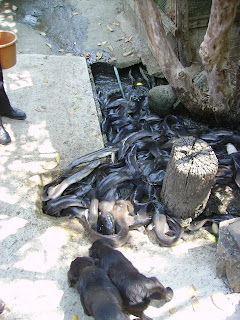After visiting Huai Hong Khrai, our group ate a delicious lunch and hustled over to visit a farm which has successfully implemented many of the techniques of the Royal Development Project. The farmer was raising pigs, chickens, cows, frogs, and catfish, growing rice, fruit, and vegetables, and producing organic fertilizer, biofuels, and animal feed on a piece of land smaller than two acres (my estimate). It was beautifully systematic and, as one of my friends said, "inspirational."
 Catfish have huge mouths...
Catfish have huge mouths...
 ... and they are sort of frightening.
... and they are sort of frightening.
 Piglets enjoy lunch.
Piglets enjoy lunch.
 Catfish have huge mouths...
Catfish have huge mouths... ... and they are sort of frightening.
... and they are sort of frightening. Piglets enjoy lunch.
Piglets enjoy lunch.
This comment has been removed by the author.
ReplyDeleteHey Jeremy, do those visits make you want to start your own farm in Thailand? Is this farmer able to live from 2 acres? How big is his family? Do they pay property tax? Also, do they have specialty farms- it seems like that farmer is trying to do all things, wouldn't unit of production be cheaper with size and specialization? Is agriculture land available for purchase? Is bank financing available for land and equipment purchase or is it cash only type of economy?
ReplyDeletecrazy stuff jeremy
ReplyDeleteThis farmer is able to send three of his daughters to University of Chiangmai, and he has recently bought more land with his profits. He has also been able to get out of the monstrous debt he was in before due to chemical fertilizers and trying to specialize. Avoiding monocropping allows him to create a natural system which decreases the needs for human inputs, allowing instead nature to do what it does best.
ReplyDeleteAnd yes, it does make me want to have a farm. :-)
Additionally, a system of monocropping sets as farmer up for disaster in case of crop failure or drop in global demand.
ReplyDelete